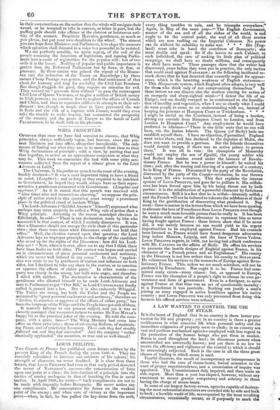LOUIS PHILIPPE.
THE Gazette de France has published some letters written by the present King of the French during the years 1806-8. They are certainly calculated to increase our estimate of his talents : his strength of character we never doubted. It is clear from these letters, that Louis PHILIPPE had even at that early period detected the secret of NAPOLEON'S success—the concentration of force upon one point at a time ; the introduction of a principle into the tactics of armies analogous to that of breaking the line in naval tactics. In April 1808, he wrote—" Such compliments are not to be made with impunity before Bonaparte. He never makes any one compliments. He concentrates his forces on the weakest point of the enemy ; and when sure of victory at the important point—when, in fact, he has pulled the key-stone from the arch,
every thing tumbles to ruin, and he triumphs everywhere.° Again, in May of the same year—" The English Government,
master of the sea and of all the riches of the world, is and
ought to be the central point, the soul of all those armies which are now rushing on the Imperial Colossus. No power can do without its subsidies to make war. * * * She (Eng- land) must take in hand the overthrow of Bonaparte; she must decide and speak : for if she leaves to each Cabinet, to each individual, the care of making its little plan of political campaign, we shall have no doubt millions, and consequently we shall have none." These passages show that the writer had
discovered, years before they were put in practice, the only tactics
that could avail against NAPOLEON; as the following incidental re- mark shows that be had detected that cowardly regard for appear-
ances which is the besetting weakness of English statesmen- " This Harpocratic system, which England often adopts, is very well for those who think only of not compromising themselves." In these letters we can discern also the restless craving for action of an energetic and sharp-sighted mind—" I detest the life of an Emigre, and am doubly enraged to be condemned to the humilia- tion of inutility and vegetation, when I see so clearly what I could do were people to come to an understanding with me, instead of keeping me prisoner at Hampton Court or Twickenham. * * • I might be useful on the Continent, instead of being a burden, driving my curricle from Hampton Court to London, and from London to Hampton Court." Any employment he would have preferred to idleness—" There is one little state that no one will have, viz. the Ionian Islands. The Queen (of Sicily) bade me establish myself there. I have no objection, if permitted. England went twice there, and has declared to the deputies at Malta, she does not want to provide a garrison. But the Islands themselves would furnish troops, if there was an active prince to govern them." It was all in vain : the champions of Monarchy would not employ the son of Egalite, the young soldier who had fleshed his maiden sword under the banners of Revolu- tionary France. But he was a power in himself: he waited his time ; and, after the tossing and heaving of a quarter of a century, he is King of France. Denounced by the party of the Revolution, distrusted by the party of the Counter-revolution, he was thrown back upon his own resources. This fact explains the intense egoisme of Louis PHILIPPE, and goes far to palliate it. His selfish- ness has been forced upon him by his being thrust out by both parties : it is the misdirection of a powerful character by fortuitous circumstances. Still it is a fact that he is selfish—intensely selfish ; and the French will not be induced to tolerate the selfishness of their King by the gratification of discovering what produced it. Nay more : there is matter in the letters from which we have been quoting, to alienate the love of Frenchmen from Louts Pnuarra even though he were a much more loveable person than he really is. It has been the fashion with some of his advocates to represent him as never having fought against France : these letters show that if he never did, it was merely because no one would yield to his urgent importunities to be employed against France. Had his counsels been listened to, France would have found dangerous adversaries long before Moscow, Leipzig, and the lines of Torres Vedras. LOUIS PHILIPPE regrets, in 1808, not having had a frank conference with Mr. CANNING on the affairs of Sicily. He offers his services to promote the hostile designs of England against France, in his character of " a French prince and an Englishman." His enmity to the Directory is not less ardent than his enmity to BONAPARTE. He volunteers his services to the monarchs of Europe against Revo- lutionary France. This, unless we are much mistaken, will not be pardoned by Frenchmen. Nor ought it to be. France had com- mitted many errors—many crimes : but, as opposed to Europe, France was the champion of a people's right to choose its own go- vernment and form of government. Even in a foreigner, to serve against France at that time was an act of questionable morality : in a Frenchman it was parricide. Nothing can justify a man's joining an army engaged in active hostilities against his native country ; and LOUIS PHILIPPE was only prevented from doing this because his offered services were refused.


























 Previous page
Previous page